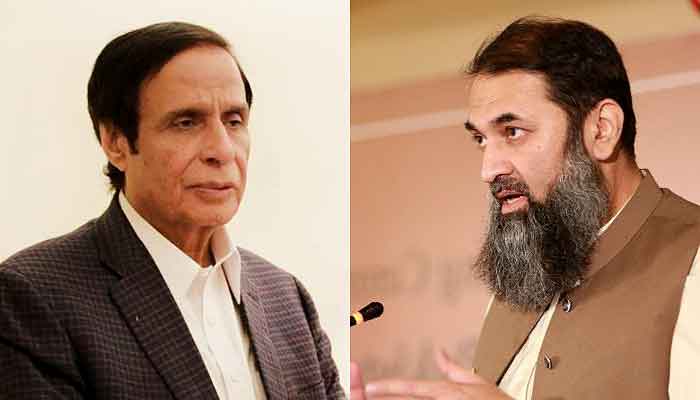- Governor’s lawyer informs LHC of de-notification order’s withdrawal.
- Punjab chief secretary’s notification declared null and void.
- CM successful in passing floor test, rules LHC
LAHORE: Following a late-night chaotic session of the Punjab Assembly during which Chief Minister Parvez Elahi managed to secure the lawmakers’ confidence, Governor Baligh Ur Rehman told the Lahore High Court (LHC) that he has taken back his order de-notifying the Pakistan Muslim League-Quaid (PML-Q) lawmaker as the leader of the house.
Elahi had challenged the governor’s orders last month after he was de-notified as chief minister. However, the LHC restored him when he assured the bench that he will not dissolve the assembly till the next hearing.
A five-member bench headed by Justice Abid Aziz Sheikh — comprising Justice Chaudhry Muhammad Iqbal, Justice Tariq Saleem Sheikh, Justice Muzamil Akhtar Shabir, and Justice Asim Hafeez — heard the case.
During today’s hearing, Barrister Ali Zafar, the counsel for the chief minister, informed the bench that his client had taken the vote of confidence. He added that 186 members expressed confidence in Parvez Elahi.
While the governor’s counsel, Mansoor Usman Awan, also confirmed to the bench that the chief minister had taken the vote of confidence.
“Is the governor satisfied with the vote of confidence?” asked Justice Abid.
At this, Awan urged the bench to make the assembly proceedings part of the court’s record.
Turning towards Zafar, Justice Abid asked the CM’s lawyer if he intended further hearing on the petition as Elahi’s floor test was complete.
On this, Zafar agreed that after the vote of confidence the petition had become ineffective but he would like to argue on the governor’s notification as it was a “matter of principle”, adding that the governor should have given reasons to remove the CM and the cabinet.
“Governor’s notification was not legal,” insisted Zafar.
Upon hearing this, Justice Abid remarked that the issue regarding the vote of confidence had been settled but now the bench had to decide whether the governor’s notification was legal or not.
However, Justice Hafeez remarked that if Zafar was contesting the legality of the governor’s order then the issue would reach a logical end.
Justice Abid agreed with the observation, saying the LHC would have to look into everything.
At this, Barrister Zafar argued that the governor’s de-notification order was illegal, and urged the court to give its finding.
Justice Abid, then remarked that the bench “now has three questions before it,” and added Elahi had taken a vote of confidence on one question.
On the issue of providing sufficient time, Zafar said he would assist the LHC on the matter.
“The third question will be if the session is not held then can the chief minister be sent home for not taking the vote of confidence,” asked Justice Abid. He added that the court can also question the governor’s decision to set a date for a vote of confidence.
The LHC then took a break for 30 minutes.
When the hearing resumed, the governor’s lawyer requested the bench for more time to take instructions from his client.
The bench approved the request and adjourned the hearing, once again.
Following the resumption of the hearing, governor’s lawyer Awan informed the bench that he has spoken to his client and he has confirmed the vote of confidence.
“Governor has taken back the de-notification order,” said the lawyer.
“You have resolved the matter within the assembly this is a good thing. Everything has happened according to the law and constitution,” remarked Justice Abid after hearing the governor’s lawyer. He added that they want minimum court intervention on such matters.
The court also made the lawyer’s statement on the governor’s decision part of the record and ruled that the CM was successful in passing the floor test.
Meanwhile, Justice Hafeez remarked that he would be giving an additional note in the verdict, adding that the bench will not go into the matter of delivering justice in this case.
The bench then disposed of the petition.
Elahi retains Punjab’s top post after ‘high drama’
Early Thursday, CM Elahi won the much-awaited confidence vote in the Punjab Assembly after lawmakers sitting on the treasury benches entrusted their trust in him, with the opposition boycotting the session in protest after tearing up the agenda copies.
The provincial chief executive took the confidence vote after LHC ruled that the governor had the authority to ask the chief minister to seek the trust of the house even during an ongoing session.
The court, had said that the chief minister should have the support of 186 lawmakers — the required number for being elected as the CM — round the clock.
A total of 186 members of the provincial assembly (MPAs) voted in support of Elahi as the chief minister on a resolution moved by Punjab Minister Mian Aslam Iqbal and Pakistan Tehreek-e-Insaf (PTI) leader Raja Basharat.
The opposition boycotted the session, claiming that the pre-requisite legal requirements were not met and that Governor Rehman’s order of vote of confidence was sub judice.


 Latest News3 days ago
Latest News3 days ago
 Latest News3 days ago
Latest News3 days ago
 Entertainment3 days ago
Entertainment3 days ago
 Latest News3 days ago
Latest News3 days ago
 Latest News3 days ago
Latest News3 days ago
 Latest News3 days ago
Latest News3 days ago
 Latest News3 days ago
Latest News3 days ago
 Latest News3 days ago
Latest News3 days ago























